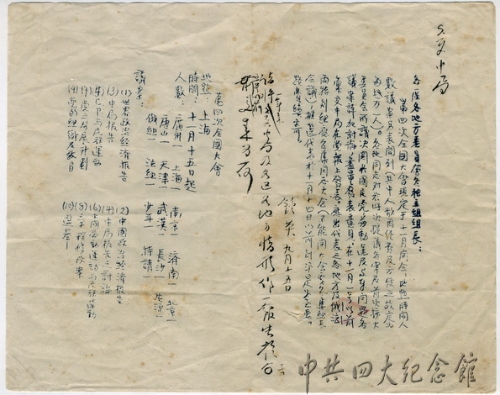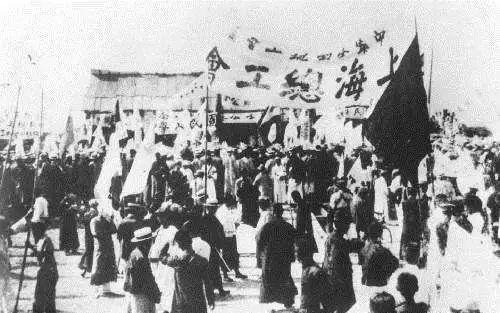1925
2021-04-26 06:57:17
January 11-22,1925
The CPC held its Fourth National Congress in Shanghai. Twenty deputies representing 994 Party members attended the congress.The central item on the agenda was: to improve Party leadership over the daily-surging revolutionary movement and do propaganda, organization- al and mass work in preparation for the upsurge in the great revolution. The participants reviewed the Party's policies formulated and implemented since the Second Congress, reaffirmed the criticism of Right deviation in the work of the Party, made at the enlarged meeting of the Central Executive Committee in May the previous year, and decided on a number of new policies concerning cooperation with the KMT, the workers' movement and the peasants' movement. It was pointed out in the documents adopted at the congress that though an important instrument to China's national movement, the KMT was not the only force in the movement. The CPC must uphold a thorough programme of democratic revolution and maintain its independence both within and outside the KMT. It must expand the ranks of the Left, oppose the Right and win over the middle-of-the-roaders through ideological, organizational and mass propaganda work. While helping the KMT in practical struggles and in expanding its organizations, the CPC must persistently combat its compromising inclination. Having looked into combination of the workers' movement with the national movement, the congress stressed the need for the workers' movement to remain independent and keep growing in the midst of the national movement so as to gain leadership and make the national movement completely revolutionary. For this purpose, the working class must have powerful trade unions based on mass participation; more important, the organizations of the industrial workers must be brought under the guidance of the CPC. Regarding the workers' joining the KMT, the congress adopted different measures for different cases, emphasizing the need to combat bourgeois influence in the trade union movement and the scheme of KMT Right- wingers for a split. Having analyzed the role of the different classes in Chinese society in the national revolutionary movement, it called attention to the importance of leadership by the proletariat and of alliance between workers and peasants. The congress summed up the experience and lessons in the cooperation with the KMT since the previous year and worked out plans for unfolding mass movement. It also decided to set up and strengthen Party organizations throughout the country to meet the needs of great development in the revolution. The shortcoming of the Fourth Congress lay in that it failed to make a correct analysis of the Chinese national bourgeoisie, holding that it had not yet become an independent class and thus obscuring its role in the democratic revolution. As a result, it had either taken all the members of that class as enemies of the revolution, confusing in principle the difference between the two stages of the revolution, or neglected the activities of the national bourgeoisie in the revolutionary camp, thus writing off the task of the proletariat to contend for leadership with it. Moreover, the congress failed to work out a correct policy for the proletariat to win leadership, emphasizing only leadership over the mass movement to the total neglect of leadership over the government and the armed forces. It revised the Party Constitution and elected the new Central Executive Committee, which elected Chen Duxiu,Zhang Guotao,Peng Shuzhi,Cai Hesen and Qu Qiubai as members of the Central Bureau,with Chen Duxiu as general secretary.
May 30,1925
Students and representatives from other social strata in Shanghai demonstrated and made speeches against imperialism. The police of the International Settlement opened fire on them, killing a dozen of them and wounding many more. This became known as the “May 30 Massacre.” On the evening of the same day, the Central Committee of the CPC called another emergency meeting, at which it decided to set up an action committee and form united front of different classes to rouse the workers, students and merchants to stage strikes against imperialism.


